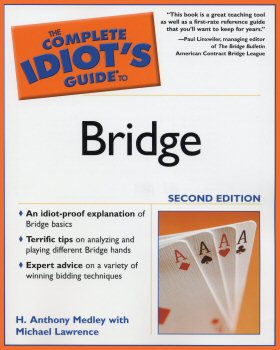| The first edition of Complete Idiot's Guide to Bridge by H. Anthony Medley was the fastest selling beginning bridge book, going through more than 10 printings. This updated Second Edition includes some modern advanced bidding systems and conventions, like Two over One, a system used by many modern tournament players, Roman Key Card Blackwood, New Minor Forcing, Reverse Drury, Forcing No Trump, and others. Also included is a detailed Guide to Bids and Responses, along with the most detailed, 12-page Glossary ever published, as well as examples to make learning the game even easier. Click book to order. | ||
|
Robin Hood (4/10) by Tony Medley Run time 140 minutes. Not for children. Hollywood has made big bucks making movies out of legendary tales. A case in point is the legend of King Arthur. I’m not counting, but just off the top of my head I can think of three, Knights of the Round Table (1953), A Connecticut Yankee in King Arthur’s Court (1949), and Camelot (1967), although there are many more. Not great movies, although Bing Crosby’s was entertaining. Then someone got the idea to ignore the legend and make a film about who King Arthur might have been. The result was 2004’s King Arthur set in the north of England, not Camelot and Arthur was a Roman general. Bad idea; people stayed away in droves. The lesson should have been that if you have a legend that works, stick with it. That is exactly what has happened with Brian Glazer’s Robin Hood. Ignoring the legend that spawned at least one good movie, Errol Flynn’s 1938 saga (in three strip Technicolor, a wonderfully entertaining movie in eye-popping color), and innumerable others that weren’t so good. But at least they were sticking with the legend. But this isn’t the Robin Hood of your parents and grandparents. I guess if you look at it logically, there shouldn’t be anything wrong with that. All Robin Hood stories are fiction. There’s no historical record of any such person. To be specific, records show that there were two men who have been identified in contemporary documents as outlaws:
The first mention of Robin Hood as a good man comes in a 15th century document, a 2 line paring. And the claim that he robbed from the rich and gave to the poor doesn’t appear until the 16th Century. So there is nothing intrinsically wrong, I guess, in trying to create a different legend. But the first one worked for almost a millennium, so the change better be good. And that’s the big problem here; the new legend is even more preposterous than the one of him taking from the rich and giving to the poor. Glazer and Director Ridley Scott have Robin (Russell Crowe) as sort of a British George Washington, rallying the British to defeat a French invasion, setting the stage for the signing of the Magna Carta. In so doing they turn history on its ear because the French invasion occurred after the execution of the Magna Carta, not before. As to the movie, it is so slow I actually fell asleep for a moment after about an hour. It’s a pretty simple story; why does it take almost 2 ½ hours to tell it? The script (Brian Helgeland) is truly ludicrous. When Maid Marion (Cate Blanchett) dons helmet and chain mail to engage in the war with the French to thwart the invasion, they went too far; it’s laughable. There are some good performances. The best are by William Hurt as a British Baron, Max Strong (a Stanley Tucci lookalike) as a traitorous bad guy, Oscar Isaac is a hateful Prince John, and Kevin Durand as a charismatic Little John. Durand reminded me of a young Sean Connery. The movie would have been better if we had seen more of him. Not coming across as well is Danny Huston as Richard the Lion-Hearted. Richard was reputed to be 6-5 and extraordinarily handsome. That does not describe Danny Huston. In addition, Richard didn’t speak a word of English, another fact Glazer and Scott found easy to ignore, or maybe never knew. There is far too much talk in this thing, signifying nothing. Then there are the battles, especially the last one against the French. While the scenes are impressive in their scope, the battle just goes on and on and on, and quite noisily. Stars with the talent of Russell Crowe and Cate Blanchett diminish their stature by appearing in unchallenging roles like these and mediocre pictures like this. Unlike the other Robin Hood films, this one is no fun. In short, I wasn’t expecting much and I was disappointed. May 12, 2010
|
||
